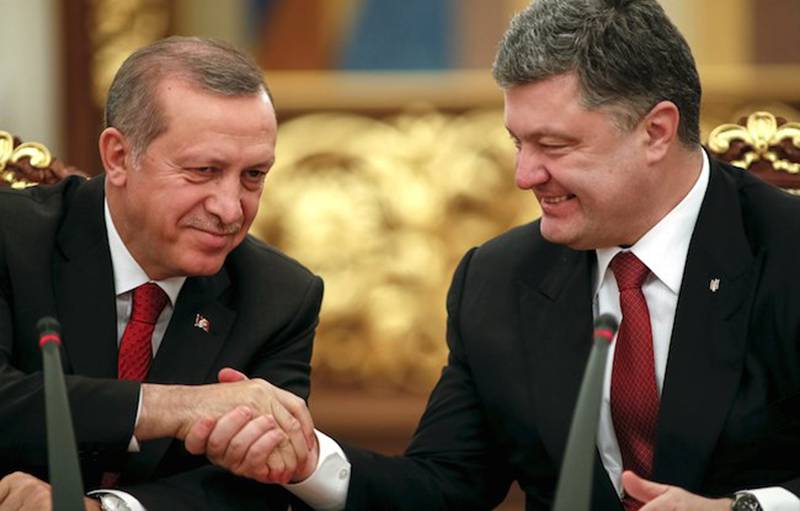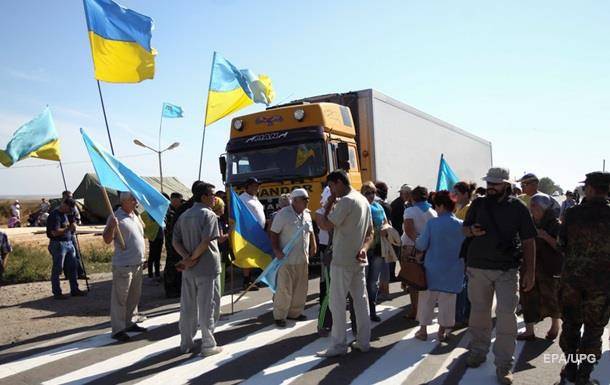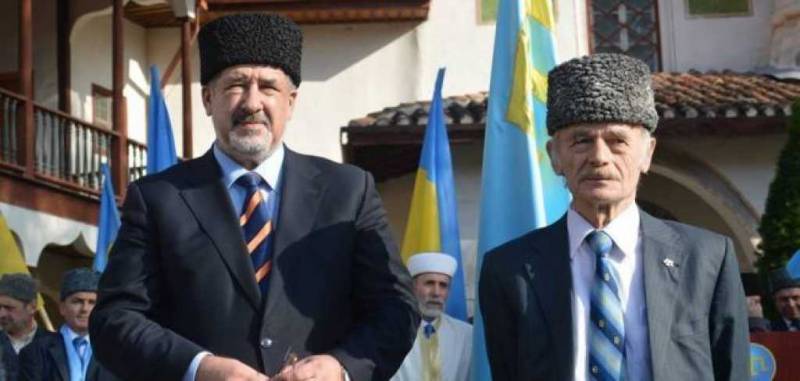Erdogan calls the Crimea Ukrainian, and considers Turkish? How Ankara refuses to recognize the reunification of the Crimea with Russia
Recep Erdogan stressed the importance of the territorial integrity of Ukraine and promised that Turkey in the future will certainly assist Ukraine in restoring its territorial integrity and sovereignty. Erdogan noted that the negotiations begun with the authorities of the Russian Federation and the resumption of bilateral relations between Ankara and Moscow will not have an impact on the crucially important issue of the status of Crimea for Turkey. Crimea for the Turkish authorities remains Ukrainian, said Erdogan. In addition, the Turkish president expressed dissatisfaction with violations of the rights of the Crimean Tatars, which allegedly took place in the Crimea after the reunification of the peninsula with the Russian Federation.

Thus, Turkey once again emphasized that on its very significant Crimean issue for Russia, its sympathies remain on the side of Ukraine. Although the reunification of the Crimea with Russia, as is known, passed after a national referendum, in which the overwhelming majority of the voters of the peninsula voted for joining the Russian Federation, Turkey is not going to recognize the Crimea as Russian. According to the Turkish authorities, the Crimean peninsula remains Ukrainian territory. But this, of course, is a pure political conjuncture.
As is known, Recep Erdogan positions himself as a Turkish nationalist and almost as a neo-osmanist. Crimea for Erdogan, as well as for many other representatives of the Turkish right-wing circles, will always be perceived as the “occupied” territory of the Ottoman Empire, part of the Turkic world, and not as part of Ukraine or Russia. Therefore, Petro Poroshenko and the Ukrainian nationalists rejoice prematurely. And Erdogan supports the Crimean Tatar nationalism not because Crimea was part of Ukraine, and now Mustafa Dzhemilev or Refat Chubarov turned into “hot patriots” of Ukraine, but because they consider the Crimean Tatars a part of the Turkic world, to which Ankara has always sought to extend its political influence.
By the way, about the Crimean Tatars. Far from all, and not even a large part of this people, supports the pro-Ukrainian positions of Dzhemilev, Chubarov and Lenur Islyamov. Many leaders of the Crimean Tatar public organizations, initially responding to the idea of incorporating Crimea into the Russian state, were very cautious, and then quickly found out and realized what preferences this promises to their people. Authoritative Russian politicians - Muslims from the Caucasus and the Volga region who visited the Crimea in the midst of the “Russian Spring” also made their contribution. By the way, Vladimir Putin acted very wisely during the reunification of the Crimea with Russia. He personally met with the leaders of the Crimean Tatar organizations and assured them that the rights of this people within Russia would not be violated. This was confirmed by the head of the Republic of Crimea Sergey Aksenov. Indeed, a number of Crimean Tatar leaders entered the highest authorities of the Republic of Crimea, public organizations of the Crimean Tatars appeared, in contrast to the pro-Ukrainian Mejlis of the Crimean Tatar people (banned in Russia) supporting the peaceful and productive establishment of relations between the Crimean Tatars and Russia and the Russian people .
The Crimean Tatar language was declared one of the three official languages of the Republic of Crimea, which, by the way, no Ukrainian government did at one time. In addition, as part of Russia, the Crimean Tatars were able to freely communicate with numerous religious and ethnolinguistic related peoples of the North Caucasus and the Volga region. The Crimean Tatar business, which had previously been active in such areas as tourism, public catering, transportation, construction and repair and finishing work, received incentives for development. In the Russian Crimea, for business, there is much more work and space for action than in those years when the peninsula was part of Ukraine.
But the Ukrainian authorities, the pro-Ukrainian Crimean Tatar nationalists, as well as a number of international human rights organizations controlled by the West, continue to argue that the rights of the Crimean Tatars are being violated so much in Crimea that it is almost a matter of repression against all representatives of this nation. The fact that Recep Erdogan spoke again about the violations of the rights of the Crimean Tatars shows that the Turkish president will remain adamant on the issue of the Crimean peninsula and its status, regardless of any flirting with Moscow.
Turkey began to flirt with the Crimean Tatar nationalists immediately after the collapse of the Soviet Union and the Crimea was part of Ukraine. By this time, the return of the Crimean Tatars from Central Asia and Kazakhstan was in full swing. If, before the collapse of the Soviet Union, the emissaries of the Turkish special services could act in the Crimean Tatar environment only illegally, then after Ukraine was declared an independent state, Turkey sharply intensified its presence in the Crimea. The interests of Ankara and Kiev coincided, first of all, in preventing the expansion of Russian influence on the peninsula. Russia was considered both by Ukraine and Turkey as the main rival in the Crimea and on the Black Sea as a whole. Naturally, the Ukrainian and Turkish politicians sought to use the Crimean Tatar population as a tool for anti-Russian policy in the Crimea, given that there was no one to rely on, except for the Crimean Tatar nationalist organizations. But, unfortunately for Kiev, not all Crimean Tatars had an interest in political activities. Most people chose to simply live, work, raise their children, but not engage in endless political struggle - first against the unreliable authorities of autonomy, and then against the reunification of Crimea with Russia.
Meanwhile, with the direct support of Turkey, numerous religious fundamentalist and nationalist organizations operated in the Crimea. Ankara carried out financial injections into the nationalist circles of the Crimean Tatar public, sent emissaries to the peninsula, since there was no shortage of the latter - since the 18th and 19th centuries, a very large diaspora of the Crimean Tatars had been living in Turkey, who had moved to the Ottoman Empire after the Crimean Khanate had joined the Russia. With the support of Turkey, all kinds of cultural and educational organizations, schools, and religious institutions that brought up the Crimean Tatar youth in a favorable Turkish spirit began to open in the Crimea in the mood of Pan-Turkism and religious fundamentalism. This activity led to the emergence of a rather impressive stratum of Crimean Tatar nationalists, especially active in the youth environment.
For a long time, Turkey was guided by the prohibited after the events of 2014-2015. in Russia as an extremist organization of the Mejlis of the Crimean Tatar people. The leader of the Mejlis Mustafa Dzhemilev, who acted as the “main” Crimean Tatar nationalist in Soviet times, maintained close relations with Turkish political and commercial circles, on whose help he relied in strengthening his influence among the Crimean Tatar population of the peninsula and the Crimean Tatar diasporas beyond it.
In the summer of 2016, a number of online media reported that the documents of the counterintelligence unit of the Crimean Directorate of the Security Service of Ukraine became known in Simferopol, which before the reunification of Crimea with Russia fought foreign espionage and political extremism in Crimea. The Ukrainian counterintelligence in Crimea worked in 2010-2013. repeatedly reported to Kiev about the presence of contacts of Mustafa Dzhemilev and some other leaders of the Mejlis with the National Intelligence Organization of Turkey. According to the data received, Dzhemilev even received wages from the Turkish special services - 50 thousand US dollars. In addition, the Mejlis constantly received funds for its needs from the Turkish Agency for International Cooperation and Development, and the money did not come to the organization’s account, but to Mustafa Dzhemilev’s personal accounts.
Regardless of whether this information is reliable or not, there is no doubt about the close contacts of Dzhemilev and other leaders of the Mejlis with the Turkish authorities. Another thing is that these contacts did not promise anything good to Ukraine at the time. After all, while the Crimea did not cede to Russia, the Turkish secret services conducted on its territory subversive activities against Ukrainian interests. However, after Euromaidan everything fell into place. Ukraine has become a state under the American external administration, with whom the Kiev authorities now cooperate and for what determine the American representatives. Since the ground for the activities of Ukrainian radical organizations in the Crimea is virtually absent (some individuals do not count), the Crimean Tatar nationalists began to be considered by Kiev as the only more or less active force capable of organizing anti-Russian provocations.

As it is known, militants of nationalist organizations undermined power transmission lines on the border of the Kherson region of Ukraine with the Crimea, the so-called “food blockade” of the Crimea was carried out for a long time, and Lenur Islyamov, one of the leaders of the Mejlis, even threatened to block the Crimean coast from the sea, although it is not clear by what means and powers. It is precisely with anti-Russian interests that Kiev’s flirting with both the Crimean-Tatar nationalists and the Turkish authorities, during contacts with which the question of the political present and future of the Crimean Peninsula inevitably arises, is explained.
Meanwhile, back in July, 2016, the leader of the pro-Russian movement of the Crimean Tatars “Kyrym” Remzi Ilyasov, said that his organization had appealed to Turkish President Recep Erdogan with a request not to succumb to the political provocations of Ukraine and recognize the Crimean Peninsula as part of the Russian Federation. The recognition of Crimea as part of Russia, in the opinion of Ilyasov, would significantly enhance security in the Black Sea region, and would also help restore good-neighborly relations between Russia and Turkey.
Of course, Ankara is well aware that Russia will not return the Crimea to Ukraine. The Turkish leadership was also informed about the actual, rather than Kiev-promoted, political situation and interethnic relations on the peninsula. But while Erdogan cannot, and does not see the point of going to the recognition of the Crimea as part of the Russian Federation. It is unlikely that Erdogan’s words on the need to ensure the territorial integrity of Ukraine will be followed by any active actions. Most likely, like recently the American representatives, the Turkish president simply uttered the duty phrase that someday Turkey would help Ukraine regain sovereignty over the peninsula.
But certain conclusions, of course, were made in Moscow. Moreover, Russia has already gone to meet Turkey after a blatant stories with the attack of the air forces of Turkey on the Russian military aircraft on the Turkish-Syrian border. After many months of tension between the two countries, Russia went to the lifting of sanctions, including allowing Russian tourists to visit Turkish resorts, and in fact for Turkey this is a huge income. In response, Erdogan did not forget to once again show Russia that the concept of gratitude is unfamiliar to him. After all, he could have refrained from discussing the Crimean issue with Petro Poroshenko, or not to touch on the topic of Ukrainian sovereignty in his speech.
Relations with Ankara can be very conditionally called a partnership and certainly not a friendship. No matter how much the Turkish leadership divides the need for good-neighborly relations with Russia, the geopolitical interests of our countries are too different. Perhaps a renewed Turkey with a left-wing political regime would have reconsidered its position in world politics, but Erdogan’s Turkey is focused on reviving Turkish influence at least in the immediate vicinity of the Turkish borders, and ideally in the entire Turkic-speaking world.
An excellent response of the Russian government to Erdogan’s words about Crimea as an integral part of Ukraine could be an additional reminder of the Kurdish problem in Turkey. Something in the spirit that "we ask the Turkish leadership to pay attention to the numerous human rights violations in the Kurdish provinces of Turkey remind the authorities of the Turkish state that every nation has the right to self-determination, including the multi-million Kurdish people." Well and, of course, in the Russian Crimea, it is necessary to be doubly attentive to any activities of Turkish organizations on the peninsula, even if they are non-political, commercial or cultural organizations.

Information